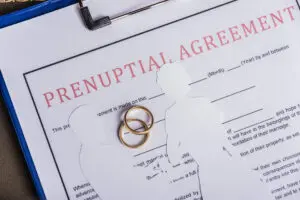Finding the right divorce lawyer is crucial for navigating your divorce journey successfully. It can make a significant difference in understanding your situation and achieving a favorable settlement. The process of finding a good divorce lawyer involves gaining insight into your needs as a couple, comprehending the legal aspects, and setting the stage for successful legal representation. By contrast, choosing the wrong attorney can lead to frustration and unsatisfactory outcomes. In this post, we’ll delve into the importance of finding an adept divorce lawyer and provide an overview of key considerations in this search process.
The Importance of a Good Divorce Lawyer
When seeking a good divorce lawyer, it’s essential to prioritize emotional support. A skilled divorce attorney should understand the need for empathy and provide comfort during this challenging time. Additionally, a divorce mediator and certified divorce financial analyst can also offer valuable support. You deserve to feel supported and understood by your legal representative.
A family lawyer who can offer emotional guidance alongside legal expertise is invaluable in a divorce case. For example, they may take the time to listen to your concerns, address your fears, and guide you through the emotional turmoil associated with divorce proceedings.
Finding a divorce lawyer who can empathize with your situation and make you feel comfortable discussing personal matters is crucial. It’s important that you feel heard and validated throughout the process of selecting a family law attorney.
In addition to providing emotional support, it’s vital to prioritize legal expertise when looking for a good divorce lawyer. This means seeking out an attorney with specific experience in handling divorces. Look for someone well-versed in family law regulations and experienced in navigating complex divorce proceedings.
A divorce mediator or attorney specializing in family law will possess the necessary knowledge of local laws related to divorces, ensuring that they can effectively represent your best interests throughout negotiations.
Another critical aspect of choosing a good divorce lawyer involves evaluating their ability to protect your financial interests during the divorce process, especially in high net worth divorce cases. Your chosen attorney should be capable of ensuring fair distribution of assets and finances while advocating for favorable outcomes on your behalf.
Consider hiring a professional familiar with financial aspects such as property division, spousal support, child support calculations, tax implications related to asset distribution, retirement accounts’ division – all key areas where having an experienced advocate can significantly impact outcomes.
Initial Steps to Finding a Divorce Lawyer

Personal referrals play a crucial role. Leveraging recommendations from friends, family, or colleagues who have gone through the divorce process can provide valuable insights into reputable lawyers. These trusted sources can offer firsthand experiences and help identify competent legal professionals.
Personal networks are invaluable resources for identifying reputable divorce lawyers. Friends or family members who have been through similar experiences can recommend skilled attorneys based on their own positive outcomes. By seeking referrals from trustworthy individuals, you can gain access to reliable legal representation that has proven effective in real-life situations.
Online Research and Reviews
In addition to personal referrals, conducting thorough online research is essential when seeking a good divorce lawyer. Utilizing online resources allows you to gather extensive information about potential lawyers’ backgrounds and reputations. Websites of law firms and individual attorneys often provide detailed profiles outlining their expertise in handling divorce cases.
Exploring online reviews and testimonials provides an opportunity to assess the credibility of potential lawyers accurately. Platforms such as Google My Business, Avvo, TrustAnalytica or Yelp feature client feedback that sheds light on the quality of service provided by different attorneys. Examining these reviews helps in gauging client satisfaction levels and understanding how previous clients have experienced working with specific lawyers.
Evaluating Lawyer Credentials
Experience Level
When selecting a divorce lawyer, experience plays a crucial role. It’s essential to prioritize potential lawyers with a proven track record of successful case outcomes over time. An experienced lawyer is more likely to provide high-quality legal representation due to their familiarity with various divorce scenarios and legal strategies. Their experience enables them to navigate complex legal procedures efficiently, ultimately benefiting the client.
Choosing a lawyer with substantial experience in handling divorce cases can significantly impact the outcome of the proceedings. For example, a lawyer who has successfully resolved numerous divorces involving child custody or complex asset division is better equipped to handle similar aspects within your case. This expertise can lead to better negotiation skills and an increased likelihood of achieving favorable results for you.
Specialization
Opting for a lawyer who specializes specifically in divorce law offers distinct advantages. By choosing a specialist in family law matters, you ensure that your attorney possesses in-depth knowledge and understanding of the intricacies associated with divorce cases. A specialized divorce lawyer is well-versed in relevant state laws, court procedures, and precedents specific to divorce proceedings.
The benefits of working with a specialized attorney extend beyond legal expertise; they also possess insights into local court dynamics and individual judges’ tendencies regarding divorce cases. This familiarity allows them to tailor their approach strategically based on what has historically worked best within that jurisdiction.
Past Client Reviews
Considering past client reviews provides valuable insights into an attorney’s performance and client satisfaction levels. These reviews serve as indicators of the lawyer’s professionalism, communication style, responsiveness, and overall effectiveness when handling divorce cases.
Assessing Compatibility with Your Lawyer
Communication Style
Effective communication between clients and their lawyers is crucial. When seeking a good divorce lawyer, it’s important to look for someone who exhibits clear, responsive, and transparent communication skills. This ensures that you are kept informed about the progress of your case and any developments that may arise. Open and honest communication creates a strong foundation for trust and collaboration between you and your lawyer.
Furthermore, prioritizing open communication when choosing a divorce lawyer can help prevent misunderstandings or misinterpretations of legal proceedings. For example, if you prefer frequent updates on your case status or have specific concerns regarding the divorce process, finding a lawyer who values transparent communication can make the entire experience less stressful.
Availability
Evaluating a lawyer’s availability and accessibility for consultations and updates is essential in ensuring that your needs are met throughout the legal process. A good divorce lawyer should be committed to promptly responding to your inquiries or requests for information. Their availability plays a significant role in keeping the case progress on track while addressing any urgent matters related to the divorce proceedings.
By prioritizing lawyers who demonstrate commitment to being available for their clients, you can avoid potential frustrations associated with delayed responses or difficulties in scheduling appointments. For instance, having regular access to your lawyer allows you to address emerging issues promptly without unnecessary delays.
Approach to Conflict
Assessing how potential lawyers approach conflict resolution within divorce proceedings is critical. It’s important to find a lawyer who possesses effective conflict management skills as divorces often involve emotionally charged situations that require careful handling. By understanding how different lawyers navigate conflicts during negotiations or court appearances, you can identify an attorney whose strategies align with your preferences.
Moreover, prioritizing lawyers with proven strategies for managing conflicts during divorce negotiations ensures that contentious issues are addressed constructively rather than escalating into prolonged disputes. This approach not only contributes to smoother legal processes but also minimizes unnecessary stress associated with unresolved conflicts during divorces.
Understanding Legal Fees and Costs
Fee Structures
It’s crucial to consider upfront fees, hourly rates, or flat-rate options. Upfront fees require payment before any services are rendered. Hourly rates involve paying for the time spent on your case, while flat-rate options entail a fixed fee for the entire legal service. Assessing fee transparency and clarity is essential when evaluating potential lawyers. Look for clear communication about how fees are calculated and what they cover.
For example:
- An attorney may charge an upfront fee for filing paperwork related to the divorce.
- Another lawyer might opt for an hourly rate that covers consultations and court appearances.
- A third option could be a flat-rate structure covering all aspects of the divorce proceedings.
Understanding these fee structures will help you make an informed decision based on your specific needs and budget.
Retainer Agreements
Reviewing retainer agreements carefully before committing to legal representation is significant. These agreements outline the terms, conditions, and obligations associated with hiring a lawyer. It’s essential to ensure clarity regarding retainer agreements to avoid misunderstandings later on. By carefully reviewing this document in detail, you can gain insight into what services are covered under the retainer agreement and what additional costs may arise throughout your case.
For instance:
- A retainer agreement might specify whether court appearances or phone calls are included in the initial fee.
- It could also outline any additional expenses such as paralegal support or document preparation not covered by the retainer.
Preparing for the Consultation
Documentation
Thorough documentation is crucial throughout the divorce process. It plays a vital role in legal proceedings and building strong cases. Look for lawyers who prioritize accurate recordkeeping and documentation, as this can significantly impact the outcome of your case. For example, if you’re seeking child custody, having detailed records of parenting responsibilities and involvement can strengthen your position.
When choosing a divorce lawyer, understanding their approach to documentation is essential. A lawyer who values comprehensive and meticulous recordkeeping demonstrates a commitment to presenting a compelling case on your behalf. This attention to detail can be pivotal in negotiations or court proceedings.
Questions to Ask
During initial consultations with potential divorce lawyers, it’s important to ask relevant questions that will help you make informed decisions about representation. Inquire about their experience handling cases similar to yours, as well as their approach and strategy for your specific situation.
Asking about free divorce consultations is also crucial when preparing for these meetings. Many reputable lawyers offer free consultations, allowing you to assess whether they are the right fit without financial obligation upfront. Discussing legal fees and costs during these sessions will provide clarity on what to expect regarding expenses throughout the legal process.
Analyzing Lawyer Responses and Advice
Clarity of Explanation
When seeking a good divorce lawyer, clarity of explanation is crucial. You want an attorney who can explain complex legal concepts in terms that you understand. Look for lawyers who can clearly communicate about legal processes, your rights, and your obligations. A lawyer’s ability to simplify intricate legal jargon into plain language is essential for you to make informed decisions.
For instance, if a potential lawyer explains the division of assets during a divorce using simple examples or analogies that resonate with you, it shows their capability to convey complex information clearly. This ensures that you are well-informed about the proceedings and can actively participate in decision-making.
It’s important to prioritize lawyers who have excellent communication skills and can articulate legal matters in an easily understandable manner. Clear explanations help build trust between you and your attorney as they guide you through the complexities of divorce proceedings.
Strategy Suggestions
Another critical aspect when evaluating potential divorce lawyers is considering their strategy suggestions. Assess how each attorney proposes strategies for handling specific aspects of your case. Look for innovative approaches or tailored strategies offered by prospective attorneys that are specifically designed to address the unique circumstances surrounding your divorce.
For example, if one lawyer suggests mediation as a strategy for resolving disputes amicably while another focuses on aggressive litigation tactics, this gives insight into their strategic thinking and problem-solving abilities based on the specifics of your case.
Evaluating these proposed strategies allows you to gauge whether the attorney has considered all possible angles related to your situation before formulating a plan of action. It also demonstrates their ability to adapt their approach based on individual cases rather than applying generic solutions across all scenarios.

Making the Final Decision
Comparing Prospects
Comparing multiple prospective lawyers is crucial. Evaluate each candidate based on criteria such as experience, communication style, and approach. By making informed comparisons, you can select the most suitable attorney for your specific needs.
Consider the experience of each lawyer in handling divorce cases. Look for someone with a proven track record in achieving favorable outcomes for their clients. Assess their communication style during initial consultations; this will give you an idea of how they’ll interact with you throughout the legal process. Consider their approach to handling divorce cases – whether they favor mediation or litigation.
- Experience in handling divorce cases
- Communication style during initial consultations
- Approach to handling divorce cases (mediation vs. litigation)
Trusting Your Instincts
Trusting your instincts when choosing a divorce lawyer is essential. While evaluating candidates based on facts is important, recognizing intuition as an equally valuable factor can lead to a more confident decision-making process.
Your gut feeling about a particular lawyer matters; if something doesn’t feel right during your interactions or research, it’s worth considering that instinctual response alongside factual assessments. Encouraging confidence in your decision-making process involves acknowledging the value of intuition and incorporating it into your overall assessment.
The Hiring Process
Contract Review
When searching for a good divorce lawyer, it’s crucial to review the contract thoroughly before signing. Look for details about the lawyer’s fees, payment structure, and any additional costs. Ensure that the contract clearly outlines the scope of services provided and sets realistic expectations.
Take note of any clauses related to termination of the agreement, potential conflicts of interest, and confidentiality. It’s essential to understand your rights and responsibilities as a client. If there are unclear provisions or legal jargon you don’t comprehend, seek clarification from the lawyer before proceeding.
An example would be ensuring that all communication between you and your attorney is confidential unless you provide explicit consent for disclosure. This ensures that sensitive information related to your case remains protected.
Official Engagement
Once you’ve carefully reviewed and understood the terms outlined in the contract, it’s time to officially engage with the selected divorce lawyer. This typically involves signing an engagement letter or agreement with the attorney or their law firm. The engagement letter formalizes the relationship between you as a client and your legal representative.
The engagement letter should detail specifics such as billing rates, retainer amounts (if applicable), methods of communication, expected timelines for case updates, and other pertinent details regarding working together throughout your divorce proceedings.
It also serves as an opportunity to address any remaining questions or concerns about how your case will be handled moving forward. This step solidifies both parties’ commitment to working together effectively towards achieving favorable outcomes in your divorce proceedings.
Conclusion
You’ve now gained valuable insights into the crucial process of finding a skilled divorce lawyer. Remember, it’s not just about their credentials but also about your comfort level and their ability to understand your unique situation. Take the time to prepare for consultations and analyze their responses carefully. Your final decision should be based on a combination of factors, ensuring that you’re not only getting a competent lawyer but also someone who truly has your best interests at heart. Now, go out there and find the legal representation that will guide you through this challenging time with expertise and empathy.
Frequently Asked Questions
How important is it to find a skilled divorce lawyer?
Finding a skilled divorce lawyer is crucial as they can provide expert guidance, protect your rights, and navigate the complex legal processes. Their experience can make a significant difference in the outcome of your case.
What are the initial steps to finding a good divorce lawyer?
Start by researching local lawyers, seeking referrals from trusted sources, and considering their experience and expertise in family law. It’s essential to schedule consultations with potential lawyers to assess their suitability for your case.
How do I evaluate a divorce lawyer’s credentials?
Look for qualifications, relevant experience in family law, any specialized training or certifications, and their track record of successful cases. Check if they have positive reviews or testimonials from previous clients.
Why is assessing compatibility with my lawyer important?
Compatibility ensures effective communication and understanding between you and your lawyer. This connection helps build trust and confidence throughout the legal process while ensuring that you feel comfortable discussing personal matters related to your case.
What should I consider regarding legal fees when hiring a divorce lawyer?
It’s crucial to discuss fee structures upfront during consultations. Understand how they bill (hourly vs flat fee), additional costs involved (court fees), payment plans available, and ensure transparency about all potential expenses before proceeding further.






